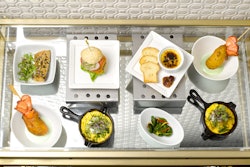
It’s not uncommon for meetings, conferences, galas, and other events to have large amounts of excess food at the end of the day. Even well-intentioned planners and companies may opt to throw it away because they don’t understand the rules governing food donations, they don’t know how to connect with organizations that serve the needy, or they don’t have the resources to transport the food. Transfernation is a nonprofit that wants to eliminate those barriers by creating a link between planners, food pantries, and volunteers.
New York University seniors Samir Goel and Hannah Dehradunwala created the organization in 2013. To date, the online platform has facilitated the donation of more than 10,000 pounds of food to more than a dozen homeless shelters and organizations that serve the needy in New York. In November, Transfernation launched a platform on the SocialEffort app to streamline the process even more.
“It’s like Uber for food rescue,” Goel says. “Planners tap in the details and put the event live, and then it sources volunteers in real time based on where they are located and what their availability and interests are. It also has geofencing so it checks them in when they arrive for food pickup, checks them in to the homeless shelter [or other beneficiary], provides last-minute instructions, and allows the corporate donors to be aware of what’s happening.”
Goel says they have found that events with at least about 50 people generally have food left over. Transfernation has coordinated food pickups from corporations such as Indeed, caterers such as Cater2.me, and individual events such as the Clinton Global Initiative’s annual meeting in September. In addition to managing the logistical aspects of food pickup and donations, Goel says a big part of his job is educating planners.
“Everyone’s first thought is what about liability. We explain there’s both federal and state law, and basically the standard is donating food that is knowingly unfit for human consumption. That’s an incredibly low standard. The way I metaphorically describe that is it’s the difference between leaving milk out on the counter for a day and then trying to give it away versus food that’s been out for an hour or two, which most people would take home as leftovers,” he says. With each donation, Goel says the service informs the recipient how long the food has been out, and then that organization determines if it can distribute it right away or safely store it. “A lot of the bigger shelters like the Bowery Mission have pretty extensive kitchen and refrigeration units, and they almost always have people lined up outside, so they can freeze it or give it out immediately,” he says.
For now, the service has been funded primarily through grants and individual donations, but Goel says they are working on a pricing model that would keep the service affordable for planners. “Our system will be something where they are still saving by working with us, and they are having a good social impact,” he says. Transfernation is also developing plans to expand beyond the New York area.



















